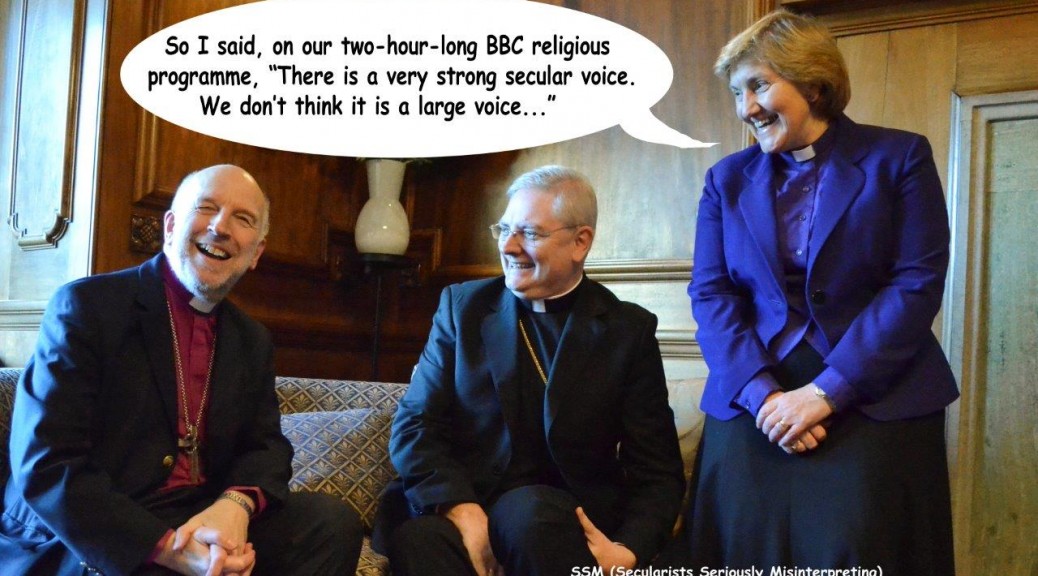
Garry Otton questions privileges held by the Church of Scotland
Speaking to a press release that went out on the eve of a Church of Scotland hosted debate on the Scottish independence referendum in London 2014, Rev Sally Foster-Fulton said Scotland had to start healing the divisions created by the independence debate. She said: “the polarised tone that has characterised much of the debate meant that rebuilding a sense of national unity… could not wait…” With the Kirk’s power to heal, she boasted: “That is something the church can help with, it is something our leaders can help with…”
Three weeks later, a principal at the University of St Andrews, Rev Ian Bradley was basking in more column inches in Scotland on Sunday to wax lyrical about “the church’s neutral stance” in the debate that “puts it in a good position to act as an instrument of healing… Together with other churches and faith bodies, and using all of its pastoral and bridge-building skills, the Church of Scotland can perhaps muster the moral authority and credibility to lead the process of rebuilding trust and healing divisions.” Dragging the Supreme Governor of the Church of England in for good measure, he gushed, “Like the churches, the monarchy has not taken sides in the independence debate and has retained its traditional stance above party politics.”
His remarks earned short shrift from Caroline Lynch, a former Chair of the Scottish Secular Society, who claimed: “They don’t even have the courtesy of responding to our emails”.
So were these just fine words to fill one of the Kirk’s regular press releases guaranteed to win the attention of Scotland’s fawning media?
Mark Gordon, the parent that kick-started the petition to allow parents to be informed what was going into their children’s’ Religious Observance in schools, and for the opportunity to ‘opt-in’ to RO, sent a leading person in the Church of Scotland’s hierarchy a private message saying, “the Scottish Secular Society are very keen to talk with the Church of Scotland about common ground.” The reply was blunt: “Sadly, I don’t think given recent comments by the Scottish Secular Society about how it views the Church and the motivations it has chosen, incorrectly, to apply publicly to the Church’s work, that there is much appetite here at the present time for conversation. That may change but for the present I need to decline your invitation. Sorry to write in such terms but I prefer to be honest about how folk see things at present.”
Certainly, their own recent comments had not deterred Mr Gordon. On a two-hour Sunday morning religious broadcast on BBC Radio Scotland in April, the Rt Rev Lorna Hood warned: “There is a very strong secular voice. We don’t think it is a large voice, but it is a strong voice which says that religion should simply be a personal thing and should have no part to play in life in general; pushed to the side-lines of life… off the pitch altogether.” The programme had only once ever invited a member of the Scottish Secular Society and – much to the understandable chagrin of the Humanist Society Scotland – to talk about humanist weddings! Secularists certainly weren’t invited on this occasion; otherwise the SSS might’ve had an opportunity to ask Mrs Hood who in the SSS had ever said such a thing?
In spite of Church of Scotland religious representatives entitled by law to sit, unelected, on every one of Scotland’s 32 education committees and boasting it held the balance of power in 19 local authorities, much of the different church’s ‘conversations’ are well-funded by Government grants. The question of interfaith funding once popped up as a parliamentary question in the House of Commons. The brazen Parliamentary Under-Secretary of State for Communities and Local Government, Shahid Malik said: “Between 2004-05 and 2007-08, my Department granted more than £5 million to interfaith projects through the faith communities capacity building fund. In 2008… we published “Face to Face and Side by Side”. Developed with faith communities, the document set out for the first time a national strategic framework for promoting interfaith activity, supported by some £7.5 million.”
And there’s plenty more in the pot… The Scottish Government awards Interfaith Scotland £120,000 annually, and that is in addition to tax exemptions and payments like the annual £70,000 other groups like the Edinburgh Interfaith Association can pocket.
Perhaps this is why there is little appetite for such ‘conversations’ with secularists, atheists, humanists, agnostics or anyone else without long enough arms to milk the interfaith cash-cow.
At a Church of Scotland co-hosted dinner, part of 4th Reformed-Roman Catholic International Dialogue, the Kirk’s Mrs Hood was able to comment on the piss-up: “It was an excellent evening with some great conversations on a host of topics. We showed that relations with the Roman Catholic Church in Scotland are indeed very warm, hospitable and friendly. We hope this continues into the future.”
I bet they do! But what can stop the Kirk misinterpreting, misinforming and lying about those pesky “aggressive secularists”?
Last November, The Scotsman printed a wildly inaccurate press release from the Church of Scotland on the Scottish Secular Society’s petition, “Pupils to get religious guidance…” which falsely claimed it was authored by the National Secular Society. (It wasn’t, since the NSS were sticking to the impossible task of kicking RO out of schools altogether.) The story gave the impression the result of the SSS’s return to Parliament on 12th November was a forgone conclusion and the right of parents to opt-in to Religious Observance had been rejected. The Scotsman refused to budge and was eventually ordered by the Press Complaints Commission to print an apology. They did and removed the story online. The Church of Scotland, however, has remained as intransigent and stubborn as ever, insisting if parents didn’t like it: they can opt-out altogether.
Garry Otton 2014

